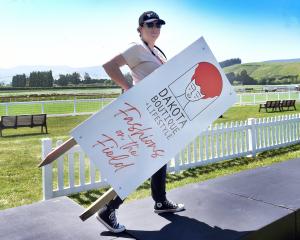Students stormed out of a university council meeting yesterday after the council voted against adding a student- or staff-elected representative.
The issue drew an unusually large audience of about a dozen student protesters, and provoked a lengthy debate concluded by two six-eight votes against student and staff-proposed amendments.
Under the constitution, which was ratified at yesterday's council meeting, the council will lose eight members (20 to 12), one student seat (2 to 1), and two staff seats (4 to 2).
The constitution had to be changed under legislation passed earlier this year, which university chancellor John Ward said he and vice-chancellor Prof Harlene Hayne had vehemently opposed.
''We were on the front foot to keep the situation as-is,'' he said.
Mr Ward and Prof Hayne were ''not convinced the reduction in size [of council] would produce merit''.
However, the legislation had passed, and the council had to respect it, he said.
Council documents show 41 individual and group submissions were made during the consultation on the draft constitution from May 20 to June 20, and 718 students and staff sent pro forma emails supporting two student and/or three staff council representatives.
The first constitutional amendment proposed at yesterday's council meeting would have added a student-elected representative to the 2016 council and the second an academic staff-elected representative.
When the second amendment was voted down, several of the student protesters screwed up the signs they had been holding and threw them away, and all left the room.
Otago University Students' Association president Paul Hunt proposed the first amendment, saying Otago student input was ''more important [to the university] than [to] any other university in Australasia'' because of the university's status as a residential, ''destination'' school.
''The student voice is most effective when there are two [student-elected council members],'' he said.
His fellow student-elected council member, Jonathan Martin, spoke in support of the amendment, as did staff-elected representatives Dr Craig Marshall, Prof Liz Slooten, and Prof Vicky Cameron.
Prof Slooten argued having two student representatives on council was ''essential ... to make sure a diverse range of voices is heard''.
Dunedin Mayor Dave Cull, who will probably not have a seat on the council under its new constitution, said ''ideally, I would prefer the opportunity for two students on university council''.
But he did not support the amendment, because the council was not the ''only place where the student voice is best heard''.
Prof Hayne agreed, saying ''in an ideal world, [Tertiary Education Minister Steven Joyce] would've left well enough alone''.
However, as to the changes, she would ''endeavour to find different - and perhaps more effect - ways'' of making sure the student voice was heard.
After both amendments failed, Mr Cull said the council should ''keep good faith of assertions made at this council meeting'' and make sure there were avenues open for students and staff to have input on university governance.
Tertiary Education Union representative Shaun Scott said he was both disappointed and unsurprised the amendments had failed.
''But we are pleased that the university council acknowledged the need to have elected representatives from both sections - staff and students - which was crucial to us.''
Mr Hunt could not be reached for comment following yesterday's council meeting.













